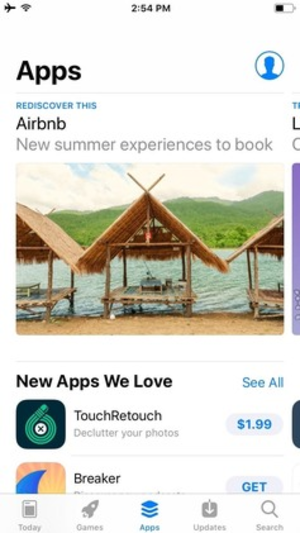IPad app
 |
|

The App Store on iOS 10, running on an iPhone 7 Plus.
|
|
| Developer(s) | Apple Inc. |
|---|---|
| Initial release | July 10, 2008 |
| Development status | Active |
| Operating system | iOS (also Windows and macOS through iTunes) |
| Platform |
iPhone iPod Touch iPad iPad Mini iPad Pro iTunes |
| Type | Digital distribution and software update |
| License | Freeware |
| Website | apple |
App Store is a digital distribution platform, developed and maintained by Apple Inc., for mobile apps on its iOS operating system. The store allows users to browse and download apps developed with Apple's iOS software development kit. Apps can be downloaded on the iPhone smartphone, the iPod Touch handheld computer, the iPad tablet computer, and to the Apple Watch smartwatch and 4th-generation Apple TV as extensions of iPhone apps.
App Store was opened on July 10, 2008, with an initial 500 applications available. As of January 2017[update], the store features over 2.2 million apps.
Developers have multiple options for monetizing their applications, ranging from free, free with in-app purchases, and paid. However, App Store has been criticized for a lackluster development environment, prompting the company in June 2016 to announce a "renewed focus and energy" on the store. Major changes introduced in the following months include ads in search results, a new app subscription model, and the ability for developers to respond to customer reviews. Additionally, Apple began a process to remove old apps that do not function as intended or that don't follow current app guidelines, with app research firms noticing significant numbers of app removals from the store. Furthermore, with the release of iOS 11 in late 2017, App Store will receive a complete design overhaul, bringing a greater focus on editorial content and daily highlights, as well as a design similar in style to several of Apple's built-in iOS apps.
Since its 2008 release, App Store has generated over $70 billion in revenue for developers.
The iPhone App Store opened on July 10, 2008. On July 11, the iPhone 3G was released and came pre-loaded with support for App Store.
After the success of Apple's App Store and the launch of similar services by its competitors, the term "app store" has been adopted to refer to any similar service for mobile devices. However, Apple applied for a U.S. trademark on the term "App Store" in 2008, which was tentatively approved in early 2011. In June 2011, U.S. District Judge Phyllis Hamilton, who was presiding over Apple's case against Amazon, said she would "probably" deny Apple's motion to stop Amazon from using the "App Store" name. In July, Apple was denied preliminary injunction against Amazon's Appstore by a federal judge.
...
Wikipedia
